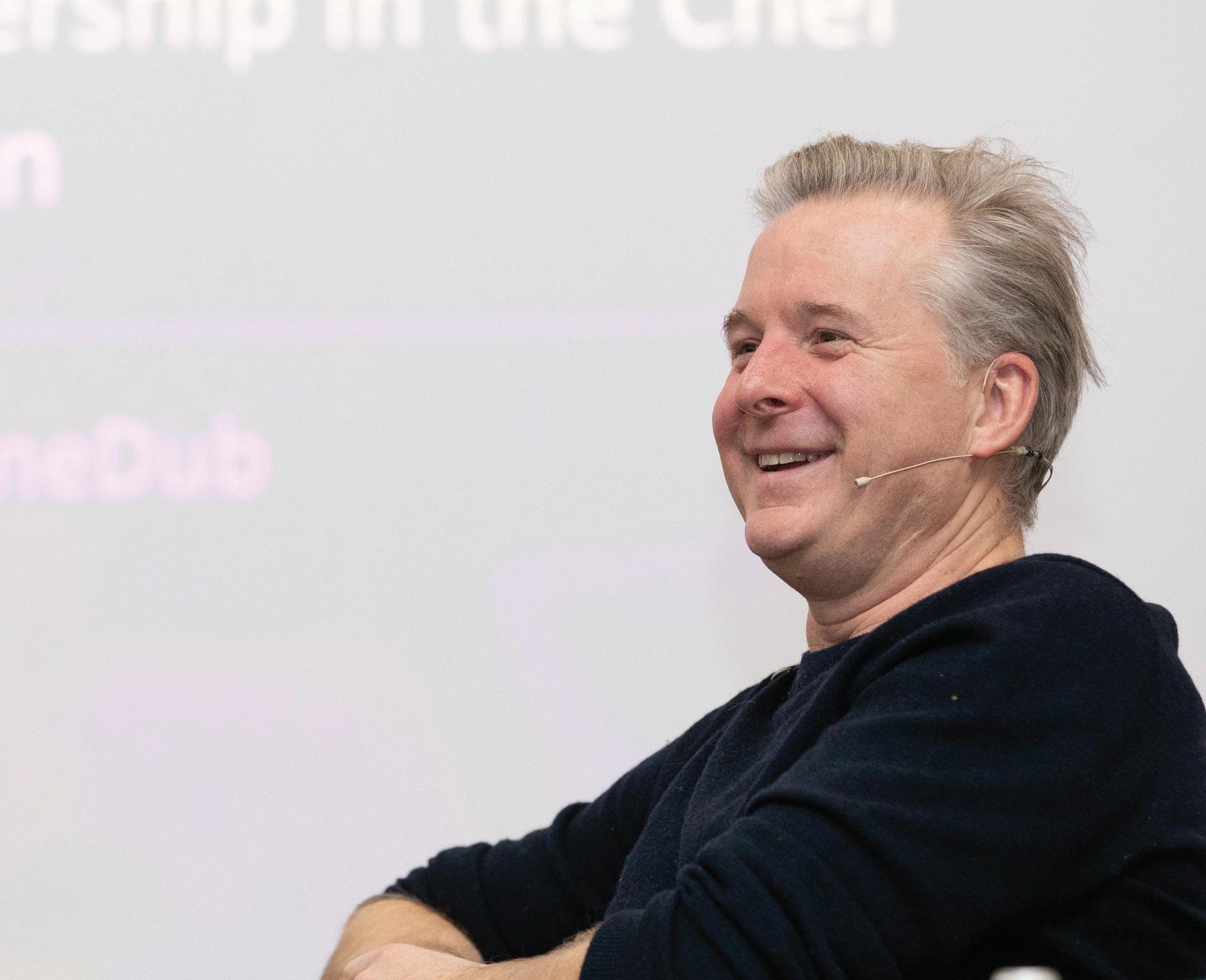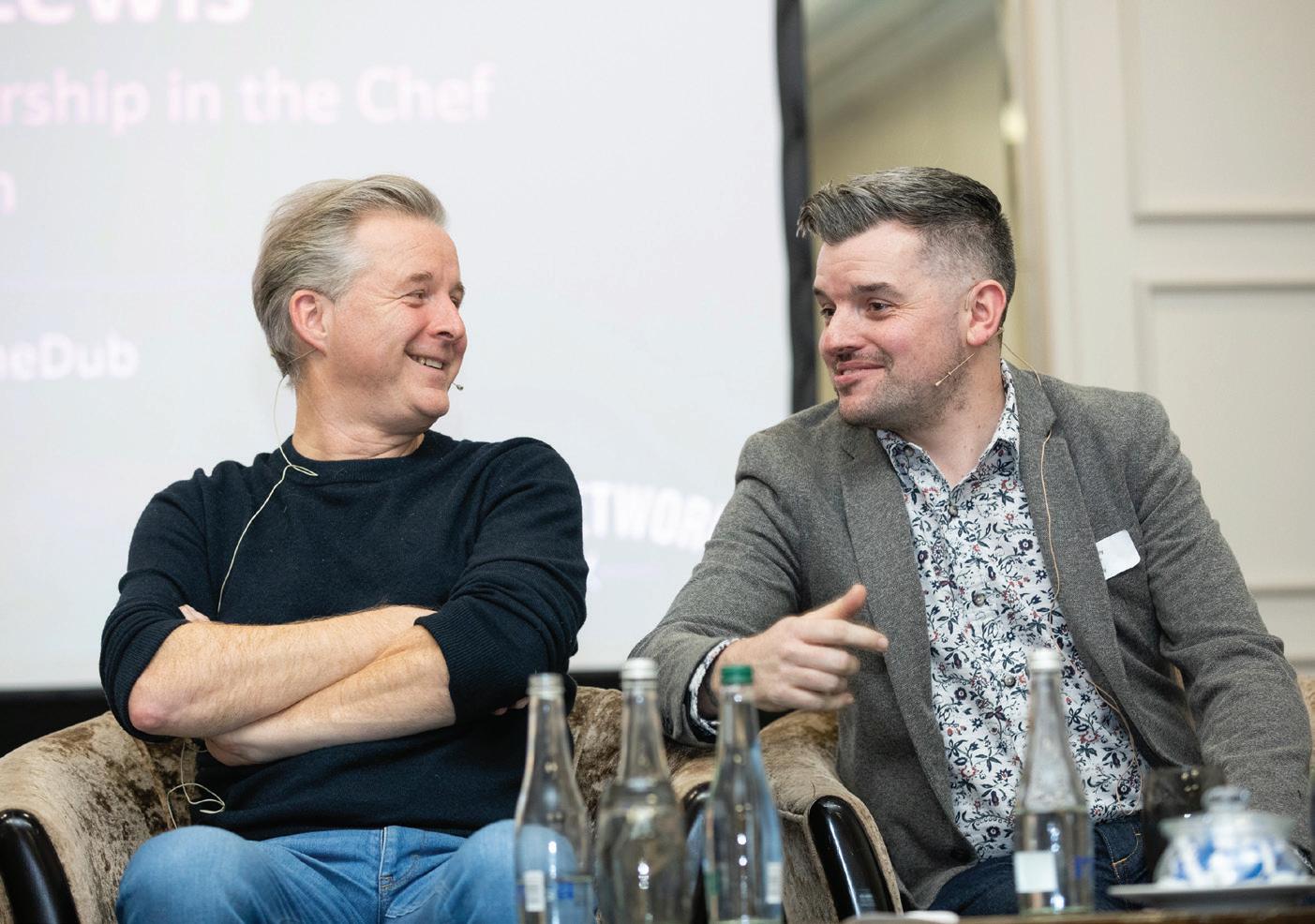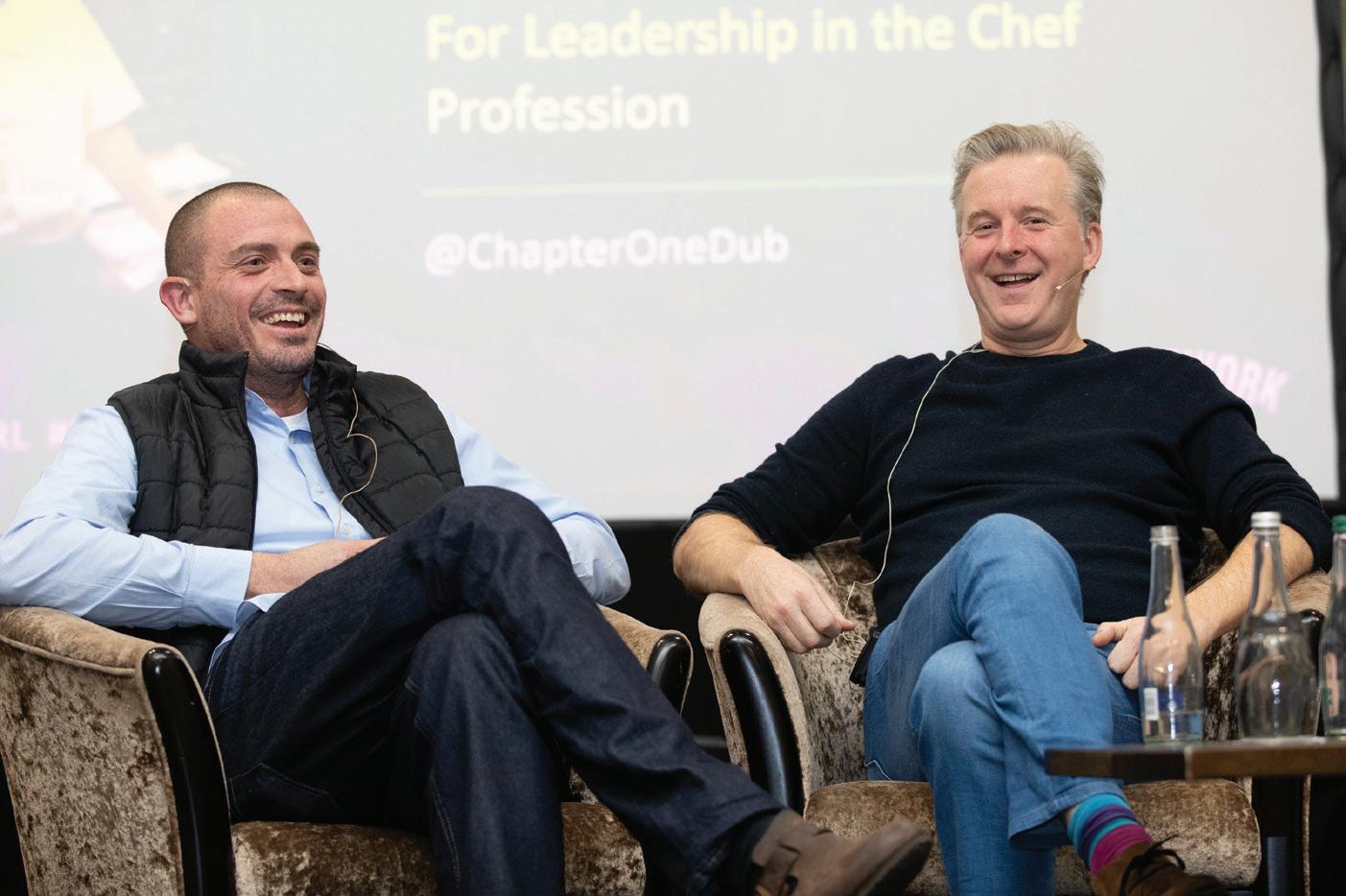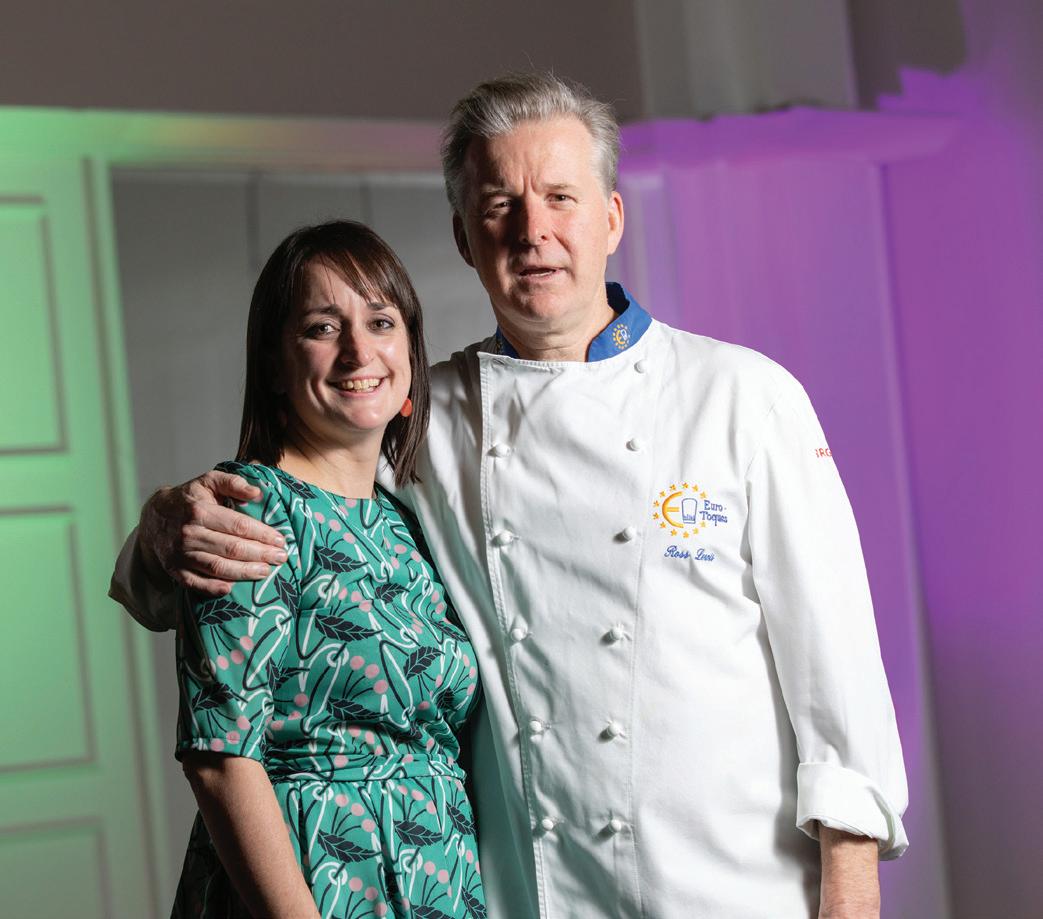
8 minute read
LEADER OF THE PACK
Ross Lewis sat down with Denise Maguire for a chat about the importance of positive role models within the industry and how it feels to be considered a force in the development of Irish food
Just before Christmas, I paid a visit to Chapter One to meet Ross Lewis. On a very wet Thursday afternoon at the end of November, the restaurant was buzzing and every table was occupied. That was to be the case for every sitting between then and Christmas Eve. Just the week before, Ross had been honoured by Chef Network for the contribution he has made to the industry over the past 20 years. Described at the event as a role model and mentor, a chef with a deep understanding of food and somebody who is committed to nurturing the next generation of Irish food talent, Ross thought he’d simply be giving a speech about leadership. “It was almost like an episode of ‘This is Your Life’. Videos from people who either work with me now or have worked with me in the past were played. It was very humbling and to receive that kind of acknowledgement of leadership from the industry was huge. The same week, I got an honorary lifetime achievement award from UCC. They only honour five people a year and no-one from the food world, particularly a chef, has been awarded one before so it was also a great honour,” said Ross.
The importance of having positive role models within the che ng world is something Ross feels very strongly about. For him, people like Myrtle and Darina Allen, Derry Clarke and Patrick Guilbaud have set the foundation for what is now the golden era of food in Ireland. “For me, Patrick Guilbaud has always been a role model. In a lot of ways he has set the standard and it’s something that I’ve aspired to.” Over the years, several successful chefs have spent time under Ross’ tutelage, such as Michelin Star chefs Garrett Byrne (Campagne, Kilkenny), Ahmet Dede (Mews, Cork) and Damien Grey (Liath, Dublin). All three paid tribute to Ross at the Chef Network event. “There’s a family tree there which is a really great thing to have. Being successful yourself is one thing but when people who worked for you become successful, that’s the ultimate reward. At that stage you’re talking about legacy and what you’ve given to the industry.”
People in the public eye are often described as ‘mentors’ or ‘role models’ without any real consideration for what those words really mean. In Ross’ case, there’s no doubt that his commitment to sta training is something that’s very tangible. Spreadsheets are drafted at the start of each year, laying out exactly what Ross and the team want to achieve on a weekly, monthly and yearly basis. All aspects of the business, like team structure and marketing are covered, along with other areas that probably don’t feature in most restaurants like ‘life skills’ training which is held four times a year. “An ex-employee turned addiction coach, who now works with Aware, came in to give a talk recently. That person talked about the 30 years they spent in addiction. We bring in motivational speakers who we feel can contribute to the wellbeing of our sta and it works very well.” The team also take trips away. “We visit farms, growers and suppliers on a quarterly basis. We also have wine experts coming in to give lectures 12 times a year. Our front of house sta are always learning about wine. They have all achieved Level 2 and some are up to Level 3.” A series of ‘Kitchen Connection’ training sessions are also held regularly. “We teach our sta certain skills that they probably wouldn’t get anywhere else. So our pastry chef might show everyone how to temper chocolate and one of our chefs might demonstrate how to bone a whole animal or fillet fish. I recently gave a talk about restaurant finances and what it takes to actually run a business like this.” Sta training occurs on a weekly basis, with no stone left unturned. Meeting and greeting customers properly, service etiquette, how to deal with customer complaints, allergy training and wine pour, to mention just a few, are covered in detail. “We’ve got 18 training modules; that’s quite a complex system of organisation. It’s not a catch all but it’s not far o it. Some places don’t do any training but we feel it’s completely necessary. We also run an extensive first aid course every year and we have a defibrillator that everyone knows how to use.” Everything that goes down on the sheets gets calendared and essentially, gets done. “We have been structuring this organisation for a long time “It was almost like an episode of ‘This is Your Life’. Videos from people who either work with me now or have worked with me in the past were played. It was very humbling and to receive that kind of acknowledgement of leadership from the industry was huge”


Advertise with us
To get your message in front of the hospitality sector please contact:
and these processes and systems are the culmination of a huge amount of work and e ort.” Ensuring that sta are trained to the highest level is reflective of the ethos carried across all aspects of the business, something that earned the restaurant a Michelin star in 2007. A lack of skilled sta has also fed into Ross’ focus on training and sta wellbeing. “We stopped doing lunches on Tuesdays, Wednesdays and Thursdays and while there was a whole conglomeration of reasons for that, one very real reason was the shortage of sta in the industry. They’re not coming in trained to the level we need them to be at. My thinking was, now that we’re not doing lunch, we have more time to invest in our employees. If you want to retain sta you have to challenge them and keep them learning and if you do that, everything else becomes more insignificant.” Thanks to the training they’re receiving, sta at Chapter One are staying longer. “Attracting sta is also a bit easier. If we’re not doing lunches, then we need to be really good at what we are doing so we need a happy, motivated bunch of sta to achieve that. People would say to me that they stay because we’re constantly driving the business forward.”
Business is good at Chapter One and that’s despite its location and the plethora of new restaurants opening on what seems like a weekly basis. “It’s like the sausage mincer; there’s some going in and some going out but staying in the mincer is the di cult part. Someone asked me recently, how have you survived for so many years. I said, the same way I always have, by providing good food and service and looking after the people that come in through the door. I’m not solely focused on PR, some people spend so much time on social media that I don’t know how they’re looking after their restaurants.” Longevity for Ross stems from sticking to what’s important and that includes training sta and delivering the very best experience to customers. “For restaurateurs that ask me that question, I’d ask them how they think they’re going to survive. I’ve got a big head start with no serious credit issues or big borrowings. This industry has become very creative but also very competitive and it’s tough to survive if you’re not focused on the right things.”
The VAT increase has been a challenge (“It’s a business call for everyone but I put my prices up. At this stage of my career I refuse to be a busy fool”) while increasing labour costs have been “savage”. With 36 members of sta , that’s a big outlay. “We try to give sta a productive work life balance and the only way to sustain that was to put the prices up. In saying that, I wasn’t prepared to charge Guilbaud prices in the north inner city.”
If Chapter One was located on Stephen’s Green, life would probably be a bit easier. “This area has been very good to me but there’s no doubt that it’s tricky. If you’re a business person entertaining guests in The Shelbourne, it would be far easier to just choose a restaurant down there rather than make the e ort to come here. Is it easier to trade around Stephen’s Green?


You bet it is.” Last year, it emerged that plans to redevelop Parnell Square as a cultural quarter collapsed due to an inability to secure financial backing for the scheme. “The Council is talking about redeveloping the terrace we’re on right now. That’s 122,000 sq ft that has been unoccupied since Chapter One started. Do you think that would happen on Merrion or Fitzwilliam Square? If you had 1000 sq ft unoccupied for a year there, you’d have numerous letters from the council.” The inaction highlights the political thinking that has completely frozen out the area for years. “It’s disgraceful. Politicians are talking about the homeless crisis and yet we have 122,000 sq ft of unoccupied space? In the early years I never cared because I was trying to survive. Now, it makes me angry.”
With no passing trade, Ross feels he and team must work harder to maintain the business. Even with a Michelin star and the enviable reputation he has built for himself over the years? “Absolutely. If you’re not working extremely hard to get people up here, it’s not going to happen. We were so marginalised in the beginning that it kind of defined our ethos because even now, we feel like we have to give a warmer welcome, try harder, give better value. It’s the only way I know how to survive. If you could tell me an easier way I’d appreciate it!”





